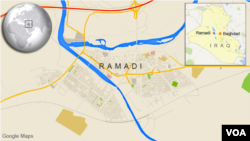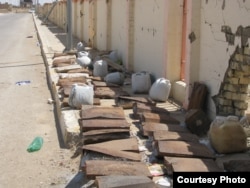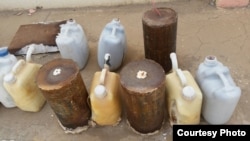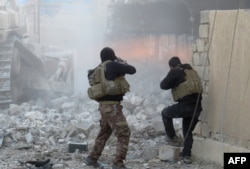It could take decades and millions of dollars before the Iraqi city of Ramadi can be deemed safe to live in, according to U.S. experts working to clear bombs planted by Islamic State.
Ramadi was freed of IS extremists in December 2015 after a fierce battle and more than 600 bombings left much of the city in ruins, 100 kilometers west of the capital, Baghdad.
According to Iraq’s prime minister’s office, 90 percent of the city is contaminated with different types of bombs and homemade explosives.
Janus Global, the company contracted by the U.S. government to search and assess the damage across the city’s 180,000 square kilometers told VOA it was a daunting task.
“At the end of the day, two 20-man teams would take 75 years to clear Ramadi. That is the scope of your issue. That is just to search it. Clearing is a lot slower,” said a member of the Janus Global team.
Clearing means being able to certify that there is absolutely nothing in a particular location that could cause any type of damage or injury to a person or property.
“If it is 75 years to search, it takes a lot longer to clear. Those can go on concurrently but, it is a huge problem,” the team member said, who spoke to VOA on condition of anonymity because of security concerns.
The United Nations has estimated that clearing the city would cost anywhere between $100-200 million. Janus Global says that is optimistic.
“I don't think that is anywhere near what it is going to cost. I would hate to guess, but I think it probably begins with a “B" [billions]. That's one city,” he said.
On front line
Adding to the challenges are the physical complications of working in a city like Ramadi, close to the IS front line, and in Iraq, which is going through severe political and economic crises.
“Logistically speaking it was a challenge due to security. This is not an ordinary mine action program. It is a lot more complicated logistically to bring in personnel and equipment,” said Natalie Wazir, program manager for the State Department’s Weapons Removal and Abatement office.
Speaking to VOA over the phone from Washington, Wazir said that Janus Global had already been forced to stop work for a week due to security concerns.
Unlike most assessment and clearance operations that take place after a conflict is over, and usually in open, rural areas, Ramadi is still close to the ongoing fighting, and is a crowded urban area where many of the buildings are covered in rubble.
Abandoned IS explosives
Add to that the types of explosives left behind or placed by IS as it abandoned the city.
“Certainly this is one of the most complex and challenging” projects, Jerry Guilbert, deputy director of the same office, told VOA. “We’re dealing with items made specifically to kill civilians.”
Working closely with the U.N. Development Program, Janus Global is first searching prioritized infrastructure, such as schools and water treatment plants. It is painstaking work.
Systematic combing
First, a team will go to a chosen location, survey to see where the potential hazards are, then cordon off the area, create lanes, and systematically search each area, and identify the explosive hazards. If they find a live hazard, they bring in the Iraqi army or police to deal with it, or, if given permission, dispose of it themselves.
Janus’ two 20-man units are split into two-man teams that can clear roughly 1,000 square meters a day.
“It all depends on the amount of contamination, the amount of damage or rubble that is in there, even environmental factors, how long can a person work in temperatures that are 33°, especially during the summertime,” the Janus official said.
As of mid-May, Janus had cleared tens of thousands of square meters, including five schools and two water treatment plants. But things can change from block to block and building to building.
One school had hardly any explosives. One block away, another building had dozens of IED components and military ordinance, including an area that was probably used as an IS bomb training center.
Residential areas
Bigger challenges lay ahead: clearing the residential areas. While typically smaller in total area, the number of places that bombs can be hidden dramatically increases.
“So if you were to take a room like this,” the Janus official said, sweeping his arm across a large hotel dining room, “every table, every chair in this room, in this place, could be booby-trapped. The cushions could be booby-trapped with pressure switches; it is just an imagination exercise. So residences provide an exceptional challenge.”
Despite the dangers, many Ramadi residents have started drifting back to their homes. But dozens have also reportedly died, killed while riding booby-trapped bicycles or rummaging in booby-trapped closets.
Janus is also starting to train Ramadi residents to identify the dangers, and in time, dispose of the explosives. But it is a slow process, and Ramadi is just one city.









